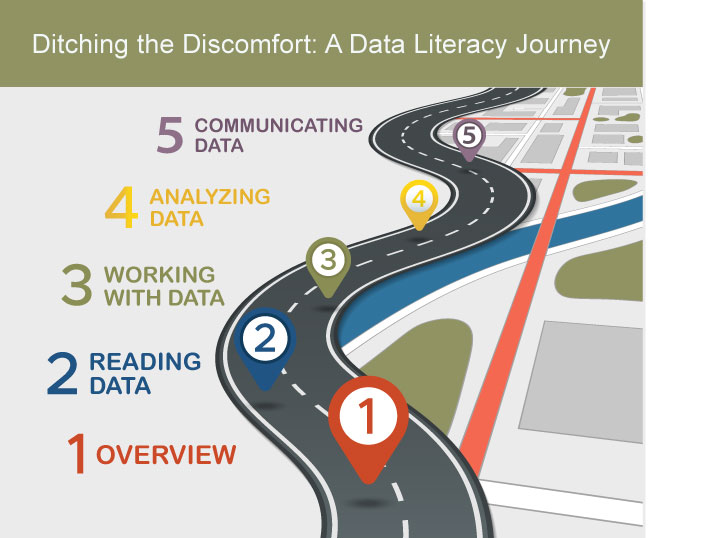
Part One of the Ditching the Discomfort with Data series, introduces the topic of data literacy and its purpose in the field of prevention, provides an overview of the components of "ditching the discomfort" with data and identify practical tips for working with data.
Select the View Resource button above to watch the recording. Below is the PowerPoint for this webinar.
 Begin Your Data Journey and Ditch the Discomfort
Begin Your Data Journey and Ditch the DiscomfortAre you curious about what you need to know as a prevention professional to participate in data-based decision-making? Have you been working with a prevention grant that requires you to conduct a needs assessment or an evaluation? If you are relatively new to prevention or new to using data, this series is for you! In this five-part series, Dr. Hayden Center will take you on a data journey, from providing an overview of the basic components of data literacy to then taking a deeper dive in parts two through four to learn more about data collection, data analysis and interpretation, and finally visualizing and communicating data to your partners. During this journey, there will be discussion and practical tips from Dr. Center; who has worked with local community prevention organizations to build capacity around working with data.

Dr. Hayden D. Center, Jr. was most recently on faculty at Auburn University at Montgomery in the Department of Psychology, where he taught for ten years. He has taught at several universities over the past thirty years. He has also been a licensed professional counselor (LPC) specializing in addiction issues for over 30 years.
Dr. Center has worked as a consultant in alcohol, tobacco, and other drug abuse prevention since 1987. He has worked in the field of prevention for more than 30 years. He served as the director of a US Department of Education (USDOE) grant while at Auburn University. He served the State of Alabama Department of Education as the coordinator of the state Safe and Drug-Free Schools Program. He was a consultant to the Alabama Governor’s Office of Drug Abuse Policy for ten years and has worked with numerous state and local agencies in the state of Alabama. He served as the evaluator for the Center for Substance Abuse Prevention’s (CSAP) Southeast Center for the Application of Prevention Technologies (SECAPT) and the Border Center for the Application of Prevention Technologies (BCAPT). He has provided over 300 trainings and workshops on the topics of “science-based prevention,” “evaluation,” “risk and protective factors”, and “sustainability.” He has worked with numerous agencies and organizations at the national, state, and local levels as an evaluator, including three Drug-Free Community grants. His experience includes working with several projects to develop data bases, collect and interpret data, and produce data dissemination products and materials.
Most recently Dr. Center has conducted training on implementation science, the psychopharmacology of marijuana, opioid use disorder, the opioid epidemic, and prevention of opioid overdose death. He is also working on the development of a sustainability toolkit that was released in the Fall of 2019. He and three colleagues presented an overview of the toolkit at the National Prevention Network (NPN) Conference in Chicago in 2019.